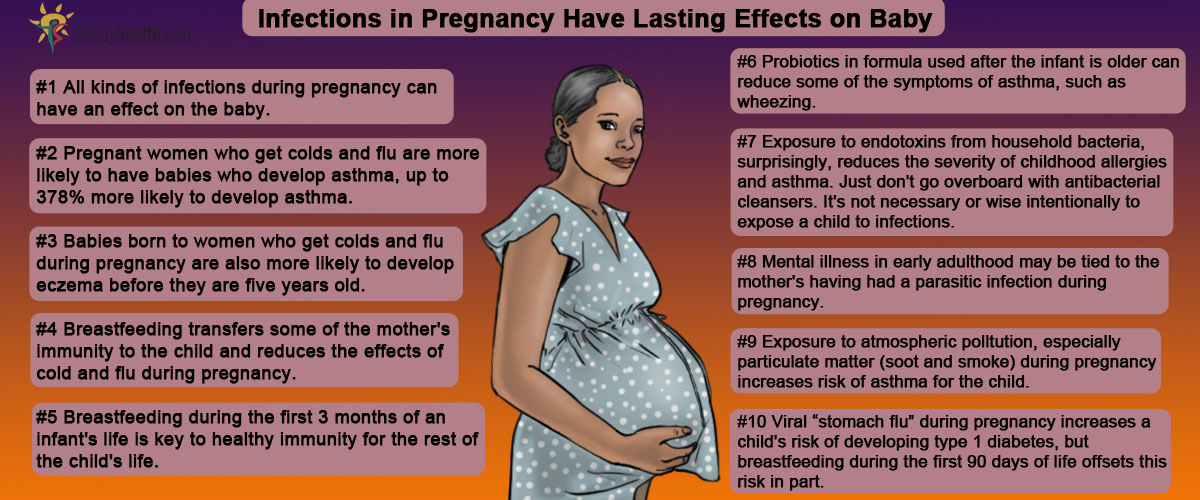Table of Contents
A study published in the February 2014 issue of the medical journal Annals of Allergy, Asthma and Immunology reports that a pregnant woman's exposure to infectious bacteria and viruses affects the uterine environment in ways that cause the baby to have a greater risk of developing allergies and asthma during childhood.
Researchers studied 513 pregnant women in Germany along with their 526 children. The mothers completed a questionnaire during pregnancy, when the child (or children) were at age 3 and then 12 months, and every year until the child's fifth birthday. In the families studied, 61% had at least one parent who had seasonal allergies, eczema, or atopic dermatitis.
Allergies and asthma are hereditary. If both parents have allergies or asthma, then the child has a 75% chance of developing one or both conditions. If only one parent has allergies or asthma, then the child has a 30 to 40% chance of developing one or both conditions. It neither parent has allergies or asthma, then the child has only a 10 to 15% chance of developing one or both conditions. This study found that mother who are exposed to "germs" during pregnancy bear children who have higher than expected odds of having allergies, asthma, or eczema by the age of 5.
How much higher?
- Children born to mothers who had breakouts of eczema during pregnancy were 75% more likely to have eczema by the age of 5.
- Children born to mothers who had breakouts of eczema during pregnancy were 111% more likely to develop seasonal allergies by the age of 5.
- Children born to mothers who had repeated colds during pregnancy were as much as 378% more likely to develop asthma by the age of 5.
- Exposure to dust mites increased the risk of asthma by 30%, but exposure to bacteria after birth lowered the risk of asthma by 22%.
Allergies, asthma, and eczema are conditions in which the immune system works overtime. If a child's immune system is programmed to fight infections while the child is still in the womb, it will tend to overreact to harmless substances in the environment after it is born. However, if a child's immune system is "busy" fighting bacteria, it is not as likely to develop allergies or allergy-like diseases.
See Also: Flu And Fever During Pregnancy Boost Autism Risk
Korean scientists have found that babies who have eczema and are then treated with probiotics containing Bifidobacterium spp. and/or Propionibacteria spp. bacteria were less likely to develop wheezing and asthma. Lactobacillus, the bacteria found in yogurt, is also helpful for preventing eczema and atopic dermatitis.
Giving babies probiotics, however, is not as successful in preventing allergies and asthma. Some clinical trials have found that they help, and other clinical trials have found that they do not. Since the objective of probiotic treatment is to "balance" the immune system, making sure that the white blood cells that make inflammatory chemicals are balanced by immune cells that make inflammation regulators, more is not better. Giving your baby a formula or food containing a probiotic once or twice a week is enough.
- Illi S, Weber J, Zutavern A, Genuneit J, Schierl R, Strunz-Lehner C, von Mutius E. Perinatal influences on the development of asthma and atopy in childhood. Ann Allergy Asthma Immunol. 2014 Feb,112(2):132-139.e1. doi: 10.1016/j.anai.2013.11.019. Epub 2013 Dec 17.
- Mindmap by steadyhealth.com
- Photo courtesy of Daniel Lobo by Flickr : www.flickr.com/photos/daquellamanera/4455140588



Your thoughts on this